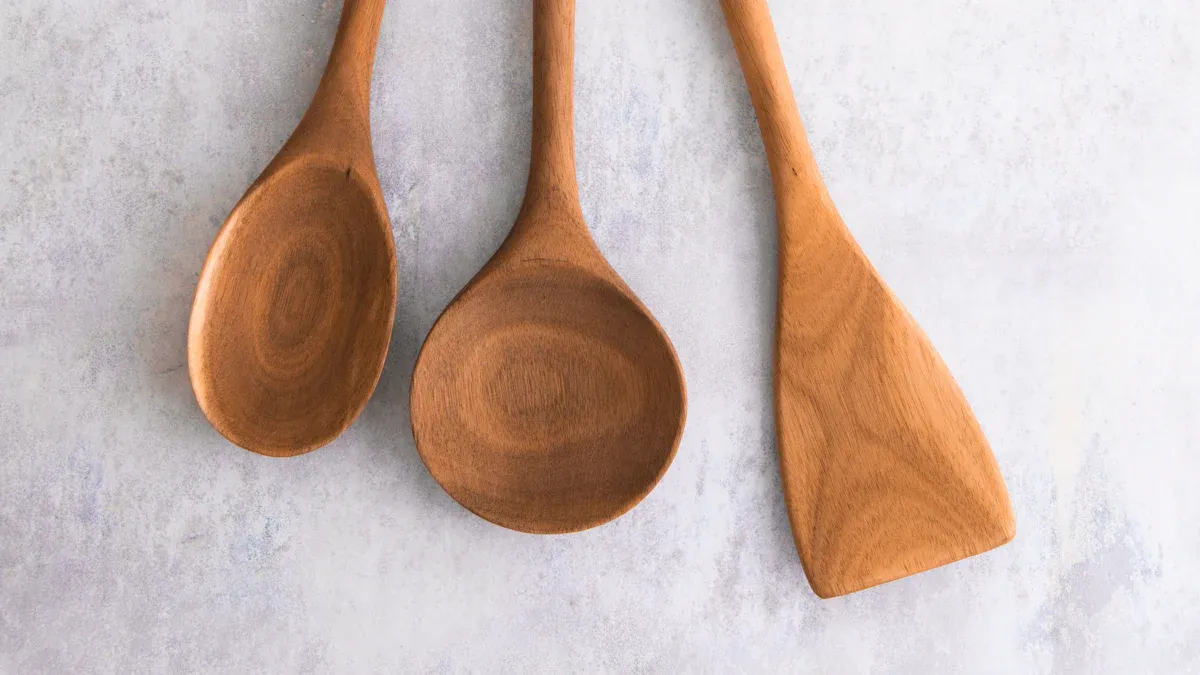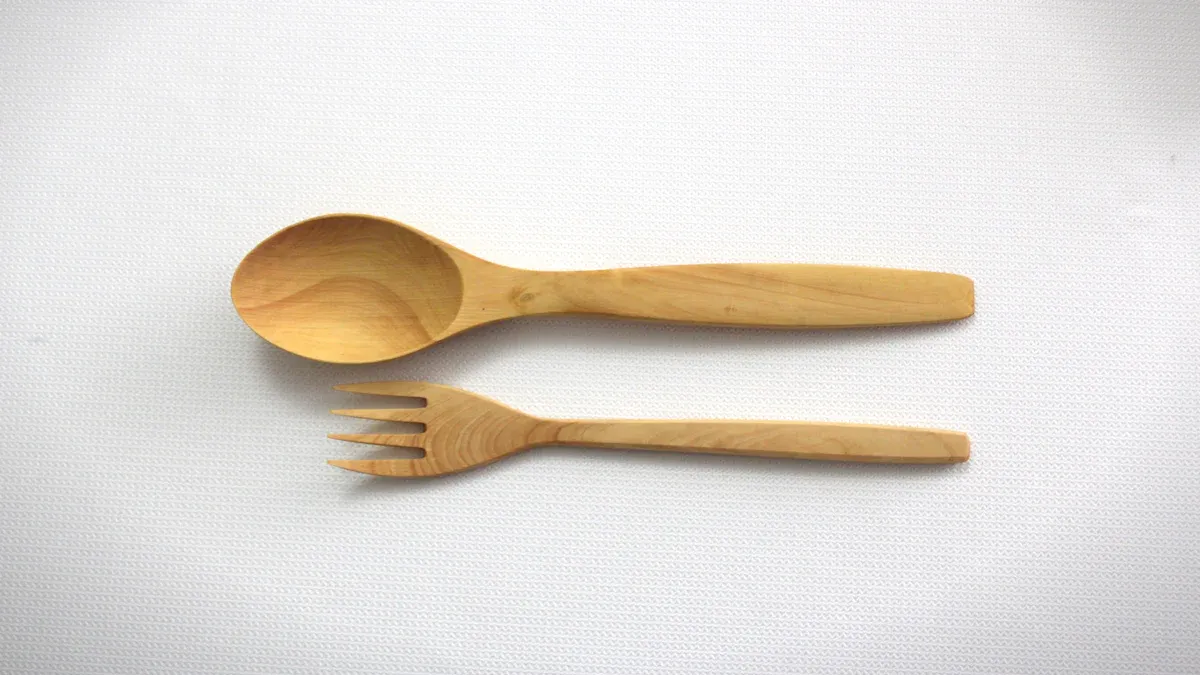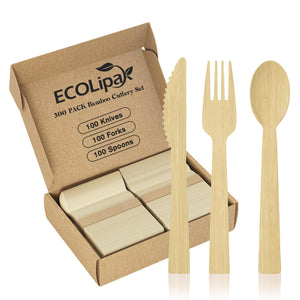You can keep your bamboo spoons in top shape at home with a few simple habits. Handwash each spoon using mild soap and warm water. Dry your bamboo utensils right away to prevent warping. Occasionally, rub them with food-safe oil to maintain their shine and strength. Avoid harsh chemicals and never use a dishwasher, since these can damage bamboo. Choosing bamboo spoons made from eco-friendly materials supports sustainability and your health. Bamboo utensils decompose naturally, unlike plastic, which lingers for centuries. The chart below shows how bamboo cutlery reduces carbon emissions by up to 75% compared to plastic.

Ecolipak’s high-quality utensils reflect a commitment to sustainability and eco-friendly living.
Key Takeaways
Handwash bamboo spoons with mild soap and warm water, then dry them immediately to prevent damage.
Avoid dishwashers, harsh chemicals, and soaking to keep bamboo utensils strong and safe.
Regularly oil bamboo spoons with food-safe oils to prevent cracks and maintain their smooth surface.
Store bamboo utensils in a dry, well-ventilated place away from direct sunlight to avoid warping and mold.
Choosing bamboo utensils supports a healthier kitchen and reduces plastic waste, helping protect the environment.
Bamboo Spoons Care Tips

Daily Cleaning
Keeping your bamboo utensils clean every day helps them last longer and keeps your kitchen healthy. After you use a bamboo spoon, rinse it right away with lukewarm water. This step removes food particles before they can dry and stick. Use a soft brush or sponge with mild, food-safe soap to gently scrub the surface. Avoid soaking your bamboo spoons, because too much water can make them swell and weaken.
Tip: Handwashing with food-safe soap and warm water protects the natural fibers in bamboo utensils. Dishwashers use high heat and harsh detergents that strip away oils, making the spoon brittle and more likely to crack.
Kitchenware experts recommend these daily care tips:
Rinse bamboo utensils immediately after use.
Use only food-safe, gentle soap.
Scrub with a soft brush or sponge.
Never use bleach or strong chemicals.
Do not soak the spoon in water.
Food scientists explain that bamboo and wood are porous. If you leave food or water on the surface, bacteria can grow inside the fibers. Handwashing and quick drying help keep your bamboo utensils safe and clean. This simple routine supports both your health and the environment.
Drying Methods
Proper drying is just as important as cleaning. Bamboo absorbs more moisture than hardwoods, so you need to dry your bamboo spoons right after washing. If you let them stay wet, they can warp, crack, or even grow mold.
Here are the best ways to dry bamboo utensils:
Pat the spoon dry with a clean towel as soon as you finish washing.
Stand the spoon upright in a well-ventilated area to air dry. This lets air reach all sides and prevents moisture from getting trapped.
In humid climates, use a fan to speed up drying and avoid mold.
Store your bamboo utensils in a place with good airflow. Avoid stacking them, because trapped moisture can cause damage.
Note: Never dry bamboo utensils in direct sunlight. Sunlight can fade the color and weaken the fibers. Also, do not use a microwave or oven to dry them, as this can cause cracks.
Material science research shows that bamboo’s vertical grain structure makes it prone to swelling and cracking if it stays wet. Immediate drying keeps your bamboo utensils strong and beautiful. Following these wood spoon care steps helps you clean and care for your cooking utensils the right way.
By following these daily routines, you keep your bamboo spoons and other bamboo utensils in top condition. You also support a cleaner, greener kitchen for your family.
What to Avoid
Dishwasher Use
Dishwashers may seem convenient, but they can damage bamboo utensils. High heat and strong detergents strip away the natural oils that protect bamboo. When you place bamboo utensils in the dishwasher, you risk warping, cracking, and fading. The intense water pressure also weakens the fibers, making your utensils less sturdy over time.
Tip: Always hand wash bamboo utensils to keep them strong and beautiful. Quick cleaning with mild soap helps preserve their natural finish.
Families who care about health and the environment choose handwashing. You protect your bamboo utensils and reduce exposure to harsh chemicals. This simple habit supports a greener kitchen and helps your utensils last longer.
Soaking and Chemicals
Soaking bamboo utensils in water or using harsh chemicals can cause serious problems. Extended soaking leads to discoloration and warping. Cracks may form, and the bamboo fibers weaken. Mold and mildew can grow if you do not dry utensils properly.
The table below shows which chemicals and cleaning agents are most harmful to bamboo spoons:
Chemical/Cleaning Agent Type |
Examples/Details |
Potential Effects on Bamboo Spoons |
|---|---|---|
Stripping Chemicals |
Sodium Hydroxide, Bleach, Boron salts |
Breaks down bamboo fibers, releases harmful chemicals |
Adhesive Glues |
Polyurethane, Epoxy, Cyanoacrylate |
Off-gassing, health risks, breakdown with heat |
Varnishes and Paints |
Melamine-formaldehyde, Benzene varnishes |
Toxicity, off-gassing, degradation |
Soaking Effects |
Prolonged soaking in water or chemicals |
Discoloration, warping, cracks, mold growth |
Cleaning Recommendations |
Mild soap, avoid soaking, dry thoroughly |
Maintains integrity, prolongs lifespan |
You should always wash bamboo utensils promptly and dry them well. Avoid bleach, strong detergents, and any chemical cleaners. Choose natural oils like olive or coconut oil for maintenance. These steps keep your bamboo utensils safe for your family and better for the planet.
Maintenance for Sustainable Wooden Utensils
Oiling Routine
You can keep your sustainable wooden utensils in excellent condition with a simple oiling routine. Oiling helps prevent cracks, keeps the surface smooth, and extends the life of your bamboo utensils and sustainable wood salad servers. Most sustainability experts suggest oiling your utensils about once a month. If you use your wood spoons or salad servers every day, you may want to oil them every two weeks. Look for signs like a rough or dry surface, faded color, or small cracks. These signs mean your utensils need oiling.
Here is a step-by-step guide for treating bamboo utensils and other sustainable wooden utensils:
Wash your wood utensils by hand with warm water and food-safe soap.
Dry them completely with a clean towel.
Apply a thin, even coat of food-safe oil to the entire surface.
Let the oil soak in overnight for best results.
Wipe off any extra oil with a soft cloth.
🌱 Regular oiling keeps your bamboo utensils and sustainable wood salad servers looking beautiful and feeling smooth. This simple habit supports sustainability and helps your kitchen stay healthy.
Recommended Oils
Choosing the right oil is important for treating bamboo utensils and sustainable wooden utensils. Always use food-safe oils, since your utensils touch food every day. Food-grade mineral oil is a popular choice because it is safe and effective. Coconut oil is another great option. It is naturally antibacterial and gives your wood utensils a pleasant scent. Beeswax blends also work well for sustainable wood salad servers and bamboo utensils.
You should avoid cooking oils like olive or vegetable oil. These can go rancid and cause bad smells or tastes. For the best results, use food-safe oils and apply them regularly. Treating bamboo utensils with the right oil keeps them strong, prevents cracking, and helps them last for years.
🥄 Treating bamboo utensils and sustainable wooden utensils with food-safe oil is a small step that makes a big difference for your family’s health and the planet.
Troubleshooting Bamboo Spoons

Odor Removal
You may notice that bamboo utensils sometimes hold onto strong smells after cooking. This happens because wood is naturally porous and absorbs odors from foods like garlic or onions. To remove these odors, wash your spoon with hot soapy water right after use. If the smell remains, rub a paste of lemon juice and baking soda onto the wood. Let it sit for a minute, then rinse and dry the spoon. This method helps neutralize odors and keeps your kitchen fresh. Regular oiling with food-grade mineral oil also protects the wood and reduces odor absorption. If odors persist after cleaning, consider replacing the spoon to maintain hygiene and food safety.
Stain Solutions
Stains can make bamboo utensils look old and affect their durability. You can treat stains quickly by making a paste with lemon juice and baking soda. Use a soft brush to scrub the wood in gentle circles for about a minute. For stubborn stains, let the paste sit longer before rinsing. If stains remain, lightly sand the affected area with fine-grain sandpaper. Always reapply finishing oil after cleaning or sanding to restore moisture and protect the wood. Prompt cleaning and regular oiling help prevent stains and keep your utensils looking new. Avoid soaking bamboo utensils, as this increases the risk of deep stains and weakens the wood.
Cracks and Splinters
Cracks and splinters can appear if you expose bamboo utensils to moisture or use them for many years. These issues affect both the durability and safety of your kitchen tools. Clean any cracked area with a vinegar-water solution before treatment. Apply food-grade mineral oil or virgin coconut oil along the grain to seal and protect the wood. For small cracks, melt beeswax and fill the gaps using gentle heat. If you find deeper cracks, use a flexible, food-safe wood glue and clamp the spoon for a day. Avoid using super glue or vegetable oils, as they can harm the wood and your health. Regular sanding and oiling prevent splinters and keep your bamboo utensils smooth. Replace spoons with large cracks or rough textures to ensure safety and maintain durability.
🌱 Caring for bamboo utensils supports a healthy kitchen and helps your family enjoy eco-friendly cooking. Simple routines like cleaning, oiling, and prompt repairs extend the life and durability of wood utensils, making them a smart choice for sustainable living.
Eco-Friendly Cooking Benefits
Best Wooden Utensils for Cooking
When you choose the best wooden utensils for cooking, you bring both tradition and innovation into your kitchen. Teak, maple, olive wood, and oak stand out for their strength and resistance to cracking. These woods make some of the best wooden kitchen utensils because they last for years with proper care. Bamboo spoons and spatulas have become popular eco-friendly kitchen companions. Bamboo grows quickly and needs little water or chemicals, making it a top choice for eco-friendly cooking utensils.
Bamboo utensils are lightweight, durable, and naturally resist bacteria. You can use them for many types of cooking without worrying about splinters or warping. Unlike plastic, bamboo and wood utensils do not leach chemicals into your food. They also do not retain flavors or odors, which helps keep your meals fresh and safe. With proper care, bamboo cooking utensils can last even longer than some hardwood options, making them a smart and sustainable choice for your home.
Choosing bamboo and wood utensils supports your health and the planet. These cooking utensils are biodegradable, compostable, and chemical-free, offering real health benefits for your family.
Non-Scratch and Heat Resistance
Wooden and bamboo cooking utensils protect your pots and pans from scratches. You can stir, flip, and serve food without damaging nonstick or ceramic surfaces. This keeps your cookware looking new and helps it last longer. Bamboo, known as the strongest woody plant, stands up well to heat and moisture. You can use bamboo spoons in hot soups or sauces without worrying about melting or warping.
Bamboo utensils resist heat up to 248°F, making them safe for most cooking tasks. They do not conduct heat like metal, so you avoid burns when handling hot foods. Wood and bamboo also have natural antibacterial properties, which add another layer of safety in your kitchen. When your bamboo spoons wear out, you can compost them or use them in creative DIY projects, reducing waste and supporting an eco-friendly lifestyle.
-
Key eco-friendly benefits of bamboo and wood utensils:
Rapidly renewable resource
Chemical-free and plastic-free
Strong, durable, and reusable
Lower carbon footprint than plastic or metal
By choosing eco-friendly cooking utensils, you help reduce pollution and support a greener future for your family.
Ecolipak Compostable Bamboo Cutlery
Product Features
You want utensils that are strong, safe, and good for the planet. Ecolipak’s Compostable Bamboo Cutlery set gives you all three. Each spoon, fork, and knife comes from 100% natural bamboo. This material gives you impressive durability. You can use these utensils for hot soup, steak, or salad. They do not bend or break easily. The smooth finish feels comfortable in your hand and does not splinter.
Ecolipak’s bamboo cutlery stands out because it is compostable. After you finish using it, you can add it to your compost bin. The bamboo breaks down naturally, so you help reduce waste. The set is BPA-free and safe for your family. You can use it at home, at school, or at a picnic. The modern design looks great on any table.
Tip: Ecolipak’s bamboo cutlery can handle temperatures up to 248°F. You do not have to worry about melting or warping.
Here is a quick look at the main features:
Feature |
Benefit |
|---|---|
100% Bamboo |
Natural, strong, and safe |
Compostable |
Reduces waste, eco-friendly |
BPA-Free |
Safe for all ages |
Smooth Finish |
No splinters, comfortable grip |
High Durability |
Handles tough foods |
Modern Design |
Fits any occasion |
Why Choose Ecolipak
You care about the environment and your health. Ecolipak helps you make better choices. When you pick Ecolipak’s Compostable Bamboo Cutlery, you choose eco-friendly products that protect the planet. The durability of each piece means you do not need to worry about breakage during meals. You can trust these utensils for birthday parties, family dinners, or outdoor events.
Ecolipak’s cutlery offers durability that stands up to daily use. You can wash and reuse them several times if you wish. The compostable feature lets you return the bamboo to the earth, closing the loop. This supports a cleaner world for your family. The durability of bamboo means less waste and fewer replacements. You save money and help the planet at the same time.
Many families and businesses trust Ecolipak for its durability and eco-friendly mission. You can feel proud to serve meals with utensils that match your values. Ecolipak’s commitment to quality and sustainability makes it a smart choice for anyone who wants to live greener and healthier.
Care Tips for Wooden Kitchen Utensils
Longevity Practices
You want your sustainable wooden utensils to last for years. Simple habits can help you protect your wooden utensils and keep them looking new. Culinary experts recommend these care tips for wooden kitchen utensils:
Oil your wood utensils about once a month. Use food-safe oils like mineral oil, beeswax blends, or fractionated coconut oil. If you have allergies, walnut oil is another option.
Always wash your wood and bamboo utensils by hand. Use mild soap and warm water. Avoid dishwashers and soaking, which can damage the wood.
Dry your utensils right after washing. Use a clean towel and make sure no moisture remains. This step prevents mold and decay.
When you oil your utensils, use a lint-free cloth. Let the oil soak in for several hours or overnight. Wipe off any extra oil to avoid a sticky surface.
Remove strong odors by rubbing the wood with a paste of baking soda and lemon juice. Rinse and dry well.
Replace any utensils that have deep cracks, mold, or splinters. This keeps your kitchen safe and your food healthy.
These steps help your wooden utensil collection stay strong and beautiful. Regular care supports both your health and the environment.
Storage Advice
Proper storage keeps your sustainable wooden utensils in top condition. You should store your wood and bamboo cooking utensils in a well-ventilated area. Keep them away from heat sources and direct sunlight. This prevents warping and fading. Always make sure your utensils are completely dry before putting them away. Moisture can cause wood to deteriorate and grow mold.
Store utensils upright in a container that allows air to flow.
Avoid sealed containers or damp drawers.
Periodically condition your utensils with food-safe mineral oil to prevent cracking.
By following these storage tips, you protect your wooden utensils and extend their lifespan. You also make your kitchen a healthier and more sustainable place for your family.
You can keep your bamboo spoons and wooden utensils in great shape by handwashing, drying well, and oiling them regularly. These simple steps help your utensils last longer and look beautiful. Choosing eco-friendly products like Ecolipak’s bamboo cutlery reduces plastic waste and supports a healthier planet. When you care for your utensils and pick sustainable options, you help protect the environment and inspire greener habits at home.
FAQ
How often should you oil bamboo spoons?
You should oil your bamboo spoons once a month. If you use them daily, oiling every two weeks helps keep them smooth and strong. Regular oiling prevents cracks and extends their lifespan.
Can you put bamboo spoons in the dishwasher?
You should not put bamboo spoons in the dishwasher. High heat and strong detergents damage bamboo. Handwashing with mild soap and warm water keeps your spoons safe and long-lasting.
What is the best way to remove odors from bamboo utensils?
You can rub a paste of lemon juice and baking soda on your bamboo utensils. Let it sit for a minute, then rinse and dry. This method removes strong smells and keeps your kitchen fresh.
Are Ecolipak bamboo spoons safe for hot foods?
Ecolipak bamboo spoons handle hot foods up to 248°F. You can use them for soups, sauces, or hot meals without worrying about melting or warping. They stay sturdy and safe.
Why choose bamboo spoons over plastic utensils?
Bamboo spoons are biodegradable and compostable. You protect your family’s health and help the planet by reducing plastic waste. Bamboo utensils offer durability, safety, and a natural look for your kitchen.






